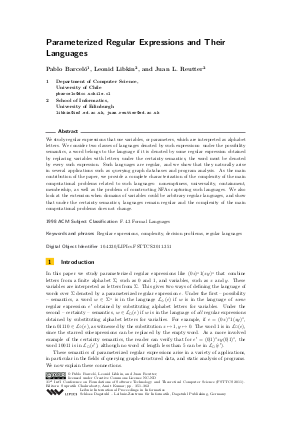Parameterized Regular Expressions and Their Languages
Authors Pablo Barceló, Leonid Libkin, Juan L. Reutter
-
Part of:
Volume:
IARCS Annual Conference on Foundations of Software Technology and Theoretical Computer Science (FSTTCS 2011)
Part of: Series: Leibniz International Proceedings in Informatics (LIPIcs)
Part of: Conference: IARCS Annual Conference on Foundations of Software Technology and Theoretical Computer Science (FSTTCS) - License:
 Creative Commons Attribution-NonCommercial-NoDerivs 3.0 Unported license
Creative Commons Attribution-NonCommercial-NoDerivs 3.0 Unported license
- Publication Date: 2011-12-01
File

PDF
LIPIcs.FSTTCS.2011.351.pdf
- Filesize: 465 kB
- 12 pages
Document Identifiers
Subject Classification
Keywords
- Regular expressions
- complexity
- decision problems
- regular languages
Metrics
- Access Statistics
-
Total Accesses (updated on a weekly basis)
0Document
0Metadata
Abstract
We study regular expressions that use variables, or parameters, which are interpreted as alphabet letters. We consider two classes of languages denoted by such expressions: under the possibility semantics, a word belongs to the language if it is denoted by some regular expression obtained by replacing variables with letters; under the certainty semantics, the word must be denoted by every such expression. Such languages are regular, and we show that they naturally arise in several applications such as querying graph databases and program analysis. As the main contribution of the paper, we provide a complete characterization of the complexity of the main computational problems related to such languages: nonemptiness, universality, containment, membership, as well as the problem of constructing NFAs capturing such languages. We also look at the extension when domains of variables could be arbitrary regular languages, and show that under the certainty semantics, languages remain regular and the complexity of the main computational problems does not change.
Cite As Get BibTex
Pablo Barceló, Leonid Libkin, and Juan L. Reutter. Parameterized Regular Expressions and Their Languages. In IARCS Annual Conference on Foundations of Software Technology and Theoretical Computer Science (FSTTCS 2011). Leibniz International Proceedings in Informatics (LIPIcs), Volume 13, pp. 351-362, Schloss Dagstuhl – Leibniz-Zentrum für Informatik (2011)
https://doi.org/10.4230/LIPIcs.FSTTCS.2011.351
BibTex
@InProceedings{barcelo_et_al:LIPIcs.FSTTCS.2011.351,
author = {Barcel\'{o}, Pablo and Libkin, Leonid and Reutter, Juan L.},
title = {{Parameterized Regular Expressions and Their Languages}},
booktitle = {IARCS Annual Conference on Foundations of Software Technology and Theoretical Computer Science (FSTTCS 2011)},
pages = {351--362},
series = {Leibniz International Proceedings in Informatics (LIPIcs)},
ISBN = {978-3-939897-34-7},
ISSN = {1868-8969},
year = {2011},
volume = {13},
editor = {Chakraborty, Supratik and Kumar, Amit},
publisher = {Schloss Dagstuhl -- Leibniz-Zentrum f{\"u}r Informatik},
address = {Dagstuhl, Germany},
URL = {https://drops.dagstuhl.de/entities/document/10.4230/LIPIcs.FSTTCS.2011.351},
URN = {urn:nbn:de:0030-drops-33334},
doi = {10.4230/LIPIcs.FSTTCS.2011.351},
annote = {Keywords: Regular expressions, complexity, decision problems, regular languages}
}
